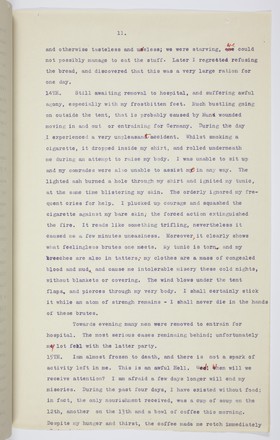
War narrative, 14 April 1917–14 May 1918, 'Thirteen months captivity in Hunland', 16 April 1917–14 May 1918
MLMSS 893 / Item 2
Manuscript

MLMSS 893 / Item 2
Manuscript
Bell’s fellow prisoners included Australian, British and Russian men. It was a grim existence and death rates were high.
Once at the Stettin camp in Germany, prisoners were allowed to write letters. Bell reports:
‘Prisoners here are permitted to write one short letter and two field cards fortnightly. Special cards were issued, to forward to the Red Cross Society; parcels containing food and clothing will be received in return, but the mail service is very irregular. Consequently a reply will take 2½ months, possibly longer.’
In the camps, food was scarce and of poor quality. Prisoners were made to eat dog and horse meat.
The treatment of wounds received in battle was a challenge in the unsanitary conditions of prison camps. Most injuries were not dressed regularly due to a lack of medical supplies. Patients’ wounds were often dressed with paper bandages.
During World War I, around 4082 Australians were taken as prisoners of war. They were captured by the Ottoman Turks in the Middle East and by the Germans in Europe.
Once the Red Cross food packages began to arrive, Bell was delighted.
Bell was taken at Bullecourt in France, where the largest number of Australians were taken prisoner (1170).